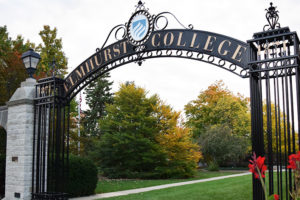
Father Robert Barron is a Catholic priest of the Chicago Archdiocese, but he preaches from an extraordinary pulpit.
He is the host and creator of the television documentary series Catholicism, which aired on many PBS affiliates last year, and a prolific presence on YouTube, where he offers video commentaries on everything from The Sopranos to the work of the late author Christopher Hitchens, an atheist who argued that religion is responsible for many of the world’s evils.
Barron told a standing-room-only audience in the Frick Center on February 8 that his multimedia ventures are part of his mission to “reach out to the culture” to communicate his Church’s message. Barron delivered the College’s annual Joseph Cardinal Bernardin Lecture.
“But it turns out the culture has serious questions,” Barron said. On YouTube, his commentaries provoke blistering responses from those hostile to Catholicism and religion in general. “We have to be properly armed to answer those questions, so that we can go out to meet the culture with confidence and evangelize the culture.”
Barron’s media ministry began seven years ago, when Chicago’s Cardinal Francis George visited Barron and told him he wanted him to “jump-start our evangelization.”
“I said, ‘What does that mean?’” Barron told the audience, drawing laughs. “And Cardinal George said, ‘I’m not quite sure, but I’d like you to do it.’”
Barron, impressed by the power of emerging online media, set about mining its potential for communicating Catholicism’s intellectual tradition. Since then, his podcasts, online videos, and DVDs have helped earn him a worldwide audience. But none of his projects has been more ambitious than Catholicism, a 10-part documentary series—with accompanying book, DVD set, MP3s and study guides— that aired on PBS affiliates in 2011. The series followed Barron from Rome to the Philippines, from Mexico City to the Holy Land, as he offered his take on the history and traditions of the church. George Weigel, an author specializing in religion and culture, called the series as “the most important media project in the history of the Catholic church in America.”
The YouTube heresies
The series’ success drew comparisons to the work of the mid-20th century Catholic televangelist Bishop Fulton Sheen. But as Barron said, Sheen’s 21st-century successors are working in media that Sheen never could have imagined. One of the most useful features of new media, Barron said, is its interactivity. He said that the strings of responses that accompany his YouTube videos remind him of the dialogical approach of one of his intellectual heroes, St. Thomas Aquinas.
“I think of those responses as a virtual version of the Summa Theologica,” Barron said, referring to Aquinas’ masterwork.
Barron’s lecture focused on his responses to the most commonly voiced objections to Catholicism that he encounters online. He called these objections “the YouTube heresies.”
He said, for example, that Catholicism’s critics—and critics of religion in general—often misunderstand the Bible, insisting that its diverse collection of stories and poems and epistles must be read as either the literal truth or demonstrably false.
“But the Bible is not a book. It’s a library,” Barron said. Readers encounter a variety of genres there, each of which demands a unique critical approach. “We have to be nimble readers, sensitive to differences in genre.”
Barron also bemoaned a recurring trope in the work of “new atheist” critics who characterize God as a “sky fairy” or “flying spaghetti monster.”
“They fundamentally misunderstand God,” Barron said. “God is not some kind of fantastic being, but being itself.”
Barron said that believers should be willing and prepared to engage critics of religion. He added that he tries to take a positive approach in his work, looking for examples in popular culture that resonate with the Christian message.
“We should be happy warriors,” he said. “We should do our work of evangelization with a certain joyful, playful panache.”